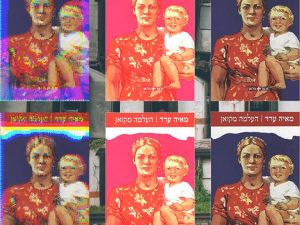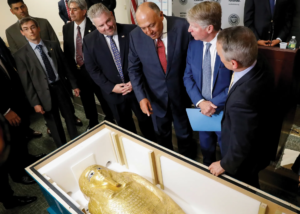‘Birds of a Kind’ will no longer play in Munich after opposition by Jewish student organizations. Eli Bijaoui, who translated the play into Hebrew, says the students ended up helping radical Islamist groups
“I know the play ‘Birds of a Kind’ down to its last comma,” says the Israeli translator Eli Bijaou. “It’s about as antisemitic as I am a Christian.”
Bijaoui, who contributed to the play’s creation, was speaking a month after an outcry from Jewish student organizations shut down the staging of its German version, “Vögel,” in Munich. “This is a false representation of one of the most respected theater productions of the past few years and this is a big loss for everyone,” he says.
The German production of Wajdi Mouawad’s play, first staged in France as “Tous des oiseaux,” was performed just four times in Munich before the theater backed down. Jewish student groups said the play, which has been performed in Israel and faced calls for a Palestinian-led boycott, relativized the Holocaust, compared Israel to Nazi Germany and contained multiple examples of antisemitism. The theater published an apology to German Jews without referencing the play’s content.
Among the examples of alleged antisemitism in the play cited by Anna Staroselski, the president of the Jewish Student Union of Germany, was a joke made at the expense of a Holocaust survivor and the onstage claim that Israeli soldiers would search Arab houses without cause, evict the residents and set their houses on fire. “The play implies that according to Jewish history and tradition, Jews are obliged to hate Arabs,” she wrote.
“I read the quotes that were compiled and misrepresented, and I cringed in embarrassment,” Bijaoui says. “The young purist – and I find it difficult to determine what she understands less, theater or Judaism – takes the position of a specific character and turns it into the position of the entire play, superficially ignoring other characters and the spirit of the play itself.”
LISTEN: the law professor fighting to stop a ‘disaster’ and save Israeli democracy’
The play was written and directed by Wajdi Mouawad, a Lebanese-Canadian playwright. It features actors from various countries, speaking in four languages onstage: English, German, Arabic and Hebrew. Bijaoui notes that Mouawad has written plays “dealing with the breakup and pain of his homeland, Lebanon. In this case, he crossed his own red line in order to contend with the pain of’ the enemy,’ meaning us.”
“Birds of a Kind” was performed at the Cameri Theater in Tel Aviv five years ago without raising any protest. The theater told Haaretz that it never encountered such allegations. Furthermore, Israel’s foreign and culture ministries helped fund the staging of the play in the country.
A trailer for a Montreal production of ‘Birds of a Kind.’
The Jewish Student Union of Germany and the Jewish Student Association in Bavaria received backing from from other organizations, such as the German state-funded antisemitism watchdog RIAS. Bavaria’s antisemitism czar Ludwig Spaenle called the accusations “serious” and called for a probe by the theater.
The play faced a backlash from the Boycott, Divestment and Sanctions movement in Geneva in 2019 over apparent funding from the Israeli embassy in France. The first production in Paris was partially funded by Israel through the joint cultural initiative La Saison Croisée France-Israel.
Israel’s involvement, and Mouawad’s collaboration with Israeli artists, also led to threats against his family, making him miss the play’s performances in Israel, although he had previously visited Israel.
- Israeli theater nixes play featuring West Bank soldiers’ testimonies
- His Work Is Censored for Being ‘anti-Israel.’ But He Won’t Be Silenced
- Arab event nixed after Israeli university bans activities over fear for ‘public wellbeing’
Bijaoui says the students opposing the play are “indirectly helping the BDS movement and the most radical Islamic organizations that came after us when we were working on the play. Their hoarse throats furiously shout baseless claims, made in the name of some kind of victimized Judaism; and with their own clumsy and belligerent hands they are destroying bridges of cooperation, dialogue and art.”
The play begins with a romance between an American student from a German-Israeli family who is studying genetics, and an Arab American student studying history. Tensions erupts during a seder meal that spins out of control, bringing the protagonists to the Middle East and to the past, in a series of events that touch on painful issues, including suicide bombings in Jerusalem and the massacre in the Sabra and Chatila refugee camps.

In order to fulfill his multinational vision, Mouawad took a different approach to writing the play. He wrote the first half and then recruited actors, translators and writers. He brought them all to a workshop in Paris.
“We spent two weeks sitting and talking around a table,” Leora Rivlin, who starred in the play in Israel from its initial staging until this year, told Haaretz in 2018. “We didn’t even read the play at first. We read the first half in the last two days of the workshop, with great excitement.”

Also taking part were actors Raffi Tavor, Rafi Weinstock and Darya Sheizaf. According to Rivlin, each of them gave their personal story and their perspective on seminal relevant events, as well as their specific cultural interpretation of the themes Mouawad wanted to discuss. “The third and fourth acts were written during rehearsals, as part of our meetings,” said Rivlin.
Threats
“Birds of a Kind” won the prestigious French grand prix de la critique for best play in 2018. Jochen Scholch, the director of the Metropol-Theater in Munich, said he was surprised by the recent criticism, saying that the quotes from the play were presented out of context. He invited the students for an open debate about antisemitism, but they rejected his offer.
He subsequently announced that he was “temporarily suspending” the play, “in the absence of an opportunity to hold a sincere dialogue, and in view of rising emotions.” He added that although he was aware of concerns about censorship, his decision was a clear message against antisemitism. The temporary suspension has now become permanent.
“Puritanism won,” Bijaoui says. “As soon as you say ‘Jews’ and ‘Holocaust,’ Germans get very stressed. They just got scared. He suspects that he knows the true motive behind the protest, which reminds him of protests held in Israel.

“The president of the students’ union is doing from a distance, in the name of Judaism, what we worry about from close up,” Bijaoui suggests. “Maybe it has to do with the fact that the playwright is Mouawad; who is he anyway, allowing himself to write about Jews? I ask myself, ‘who is the racist here and who is rejecting someone else for being different?’”
The play has another respected supporter, the Jewish American historian Natalie Zemon Davis, who served as a consultant during the writing process. Zemon Davis wrote a letter to the director of the theater stating that “there were both Jewish (including Israeli) and Arab actors in the initial performance. … No one found it antisemitic.”
She further wrote that “the world-wide Jewish community is split in its political views in regard to Zionism and the character of the state of Israel’’ and that Jewish critics of the play have, based on their statements, “a restrictive, frightened, and heartless view of what it means to be a Jew.”




